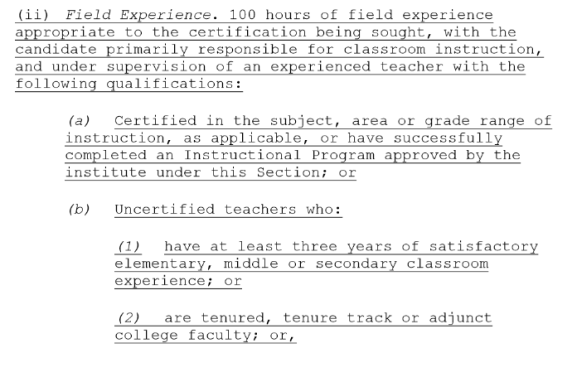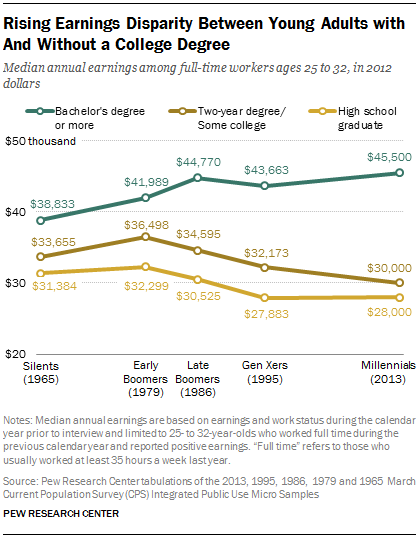Betsy Devos has drawn few headlines in recent months, and that is a good thing for the Secretary of Education. Her tenure began with Vice President Mike Pence having to break a 50-50 deadlock on her nomination vote, after her humiliating performance in confirmation hearings demonstrated how thorough her lack of relevant knowledge and experience truly was. Secretary Designate DeVos could not clearly explain a position on proficiency versus growth, danced around a straightforward question about equal accountability for all schools taking public money, and, for added measure, postulated that there must be a school in Wyoming that keeps a shotgun around just in case of “potential grizzlies.”
Following a few uncomfortable visits to schools that drew protestors, Secretary DeVos has not captured many headlines except for people following various higher education issues. For example, she rescinded Obama era guidance on sexual assault on college campus’. Her department has also taken action against various civil rights initiatives from the Obama administration such as guidance on the rights of transgender students, and her department announced it was scaling back civil rights investigations and would avoid looking into systemic issues. Secretary DeVos also rescinded 72 guidance documents for the Individuals with Disabilities in Education Act, claiming that every rescinded document was outdated or ineffective. While some of the rescinded documents were indeed out of date, the process for deciding what was “ineffective” is not at all clear and leaves disability advocates nervous. The DeVos Department of Education also removed Obama era protections for students at for profit colleges offering loan forgiveness when their schools shut down, and she plans for go further to make it far more difficult for defrauded students to get any kind of relief.
These are genuinely damaging policy shifts that fail to generate very many headlines, but they also represent an overall pattern for the Trump administration: hacking away at expansions of the federal governments role as protector of vulnerable populations is a lot easier than doing anything new. Secretary DeVos has realized that recently in her apparent disappointment that states have not gone as far as she thinks they should in their accountability plans for the Every Student Succeeds Act (ESSA). After doing very little to use what influence she has, Secretary DeVos publicly chided state school officials for meeting requirements in their ESSA plans and, in her view, largely eschewing much in the way of innovation. State leaders dispute her assessment, but the argument hints at a larger issue: with a leader who is wired to think that less government is always better in charge of a department that has to implement federal policy, it makes little sense to complain when states take you up on your offer of less interference. Having never served in any capacity in any school system in the country, Secretary DeVos appears, once again, completely unable to grasp the nature of the system she supposedly administers.
That, however, was just the warm up.
Secretary DeVos sat for an interview with Lesley Stahl on 60 Minutes which aired on March 11th. It was comprised mainly of cringe worthy moments. In fairly short order, she was unable to draw any kind of distinction between the experience sexual assault and rape and the experience of being falsely accused of the same. She hedged on the role of armed teachers in school with a meaningless anecdote about one of her own teachers. She falsely claimed that federal expenditures in education have had no impact, and then drew a strange distinction between investing in children and investing in schools and school systems as if children are taught free range in most of the country. When pressed on the impact of school choice in her home state of Michigan, she offered some pablum about how many students in Michigan are blessed with many school choices, but she could not respond to how Michigan educational outcomes have fallen during her period of greatest influence in the state. Ms. Stahl pressed her on her school visits, and Secretary DeVos stunningly admitted she has never “intentionally” visited a struggling school. When offered the suggestion that perhaps she should, she bobbed her head and smiled and said “Maybe I should.” The entire interview was peppered with flashes of a tight lipped smile, regardless of her topic, that more suggested someone trying to ingratiate herself with her interlocutor than someone in command of an important and complex subject like public education.
Don’t take my word for it — the full transcript of the segment is available here.
Secretary DeVos compounded her problem the following morning with a Tweet that she claims included information that Lesley Stahl left out of her interview:
Trouble is that those graphs show EXACTLY what Ms. Stahl was getting at: Michigan used to score right around the national average in the National Assessment of Educational Progress (NAEP), but since DeVos has been using her checkbook to support politicians who favor her views of school choice, the state has declined in the NAEP. If there is a way to demonstrate that school choice produces better outcomes for all students, that certainly was not it. DeVos also tried in her interview to claim that “studies show” positive results from school choice in Florida, but as Mark Webber points out, those studies show positive results – just really, really small ones in the tenths of a standard deviation.
It is, of course, tempting to point at the DeVos interview, laugh, and proclaim her a fitting sidekick to her boss whose just fired Secretary of State had a fairly salty opinion of his intelligence. Peter Greene cogently warns that DeVos is not necessarily unintelligent, but rather that she is so thoroughly committed to a worldview where government sponsorship of any public accommodation is bad that she cannot acknowledge that the “individuals” who make up schools come together in a building owned and operated by the PUBLIC, staffed with individuals whose salaries are paid by the PUBLIC, and which are, mostly, governed by PUBLIC democratic institutions accountable to the PUBLIC.
In Betsy DeVos’ world, the commons is an inconvenient concept that stands in the way of seeing a world solely comprised of individual actors. So she verbally erases it.
If DeVos had learned anything from her encounter with Lesley Stahl, she quickly put it out of her mind. At her keynote address for the National PTA Legislative Conference, Secretary DeVos accused CBS of editing her poorly, and then doubled down on school choice, claiming that Michigan’s poor showing under policies enacted with her financial support is because “Michigan hasn’t embraced further reforms and hasn’t yet offered parents robust choice.” To Devos, the failure of her favored reform agenda in a political playground where she has wielded unchallenged influence is simply that it has not gone far enough.

This explains why the CBS interview was such quintessential Betsy DeVos, her apotheosis as it were. She is clearly ill informed on schools and school systems, and it is equally clear that she does not care a lick to learn anything about them. The DeVos vision of education is a combination of two forces: an extreme instantiation of individual aims for becoming educated and a complete hostility to the idea that anything in the public realm has much value. Our public education system is not mandatory solely because we think that individual students will benefit from engaging in a K-12 school system solely to better their lot. We have a public education system because we acknowledge the benefits of a society where everyone has at least a level of education that helps them contribute to society as a whole and because a minimal level of education is necessary to help all members of society actively and thoughtfully engage in our Democracy. These are the contending purposes of public education that David Labaree discussed in his 1997 essay entitled “Public Goods, Private Goods,” arguing that American education had become too lopsided in favoring a view of schooling based upon individuals accumulating credentials for their own private benefit. Betsy DeVos appears completely unable to speak to the public purposes of schooling largely because she simply does not see any legitimate public purpose to anything. Public schools are only there for the individual students within them, and if the same individual benefits can be reaped without any public element whatsoever, she hardly is type to complain.
Advocates for change in American education – both in the school choice camp and in the progressive school camp – are correct to note that opportunity for individuals in schools is not equitable and to question how well many schools are doing to prepare students for their future and to participate in democracy. Various forms of choices – alternative schools, magnet programs, etc — have existed within the public system for decades, and, with careful regulation and improved resources, there is probably room for more. But none of that can work unless there is a genuine commitment at every level from the federal government to state governments to local governments and with all invested stakeholders that there are compelling public reasons for the enterprise of compulsory education.
The current Secretary of Education cannot articulate a single one.












